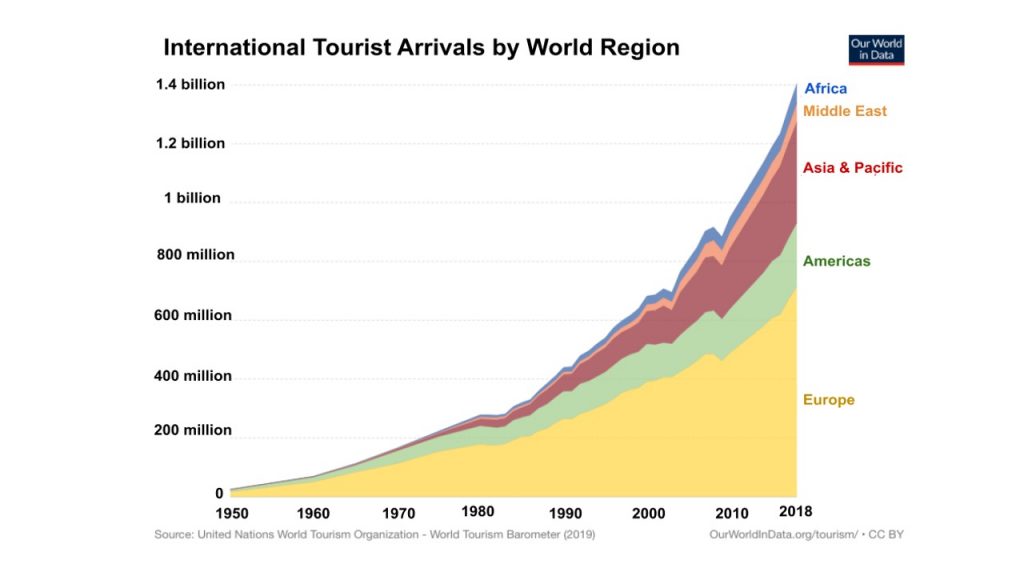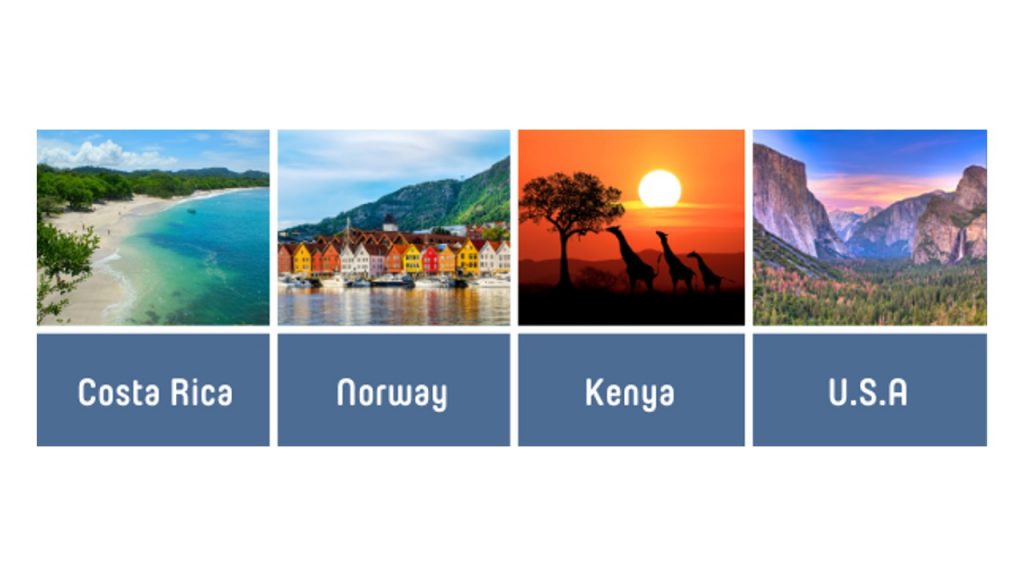The Importance of Ecotourism
By Anthony Lombardo, Bethesda Green Environmental Leader
What makes ecotourism different from traditional tourism? Ecotourism is responsible travel that assists in conserving the environment and improving the well-being of locals through economic support. With the amount of tourists expanding every year, it’s more important than ever to promote sustainability. Some of the world’s most popular destinations include countries such as Costa Rica, Norway, Kenya, and the United States. These countries are home to world renowned natural wonders, and should be at the top of your list if you are planning on traveling eco-friendly. Covid-19 has taken a toll on many ecotourism industries around the world, making it difficult for rural communities to thrive. When travel bans are lifted and worries subside, it is highly encouraged that you take your next vacation to these locations impacted by the pandemic. It not only maintains a healthy ecosystem but also provides economic support to those who need it.
Tourism has grown exponentially over the past century, and it’s negative effects have never been more apparent. According to the United Nations World Tourism Organization there were an estimated 25 million tourist arrivals in 1950, but that number increased drastically by 2018, reaching an astonishing 1.4 billion tourist arrivals. In 2019 alone, global travel and tourism contributed $8.9 trillion to the world’s GDP. Although tourism is vital to the world’s economy, the environmental side-effects are too great to ignore. Excessive tourism has been known to deplete scarce natural resources, increase pollution, destroy native habitats, and lead to soil erosion. These effects can end up destroying the natural resources that tourism itself relies on. A long term solution must be utilized by travelers in order to maintain the economic benefits that tourism provides. Research conducted by students at the University of Victoria determined the effect of tourism on a bird species native to the Gulf of Thailand. After careful observation using techniques such as habitat modelling, nest monitoring and behavioural observations the students were able to conclude that “Plovers selected wide beaches with low levels of human disturbance.” The Plovers even reproduced more successfully in the native vegetation that is typically destroyed by tourists.

There are many ways in which you can promote sustainability while on vacation in nature. A few things you can do to help minimize the negative impacts of tourism is to make sure you are utilizing public transportation, bringing reusable foodware, following local recycling rules, and utilizing local guides who understand how to protect the fragile environment. Countries usually implement and use strategies to maintain ecotourism including limiting the number of visitors, hotels and other tourist infrastructure that may impose harm on the surrounding environment. Costa Rica is home to multiple ecotourism industries. The Monteverde Cloud Forest Biological Reserve is one of the most popular destinations in Costa Rica. It showcases the wide variety of wildlife and plant life, all while being environmentally conscious. The unique combination of humidity and elevation in this forest creates a stunning formation of clouds which tourists from all over come to enjoy. Carefully conducted tours and hikes through the Cloud Forest minimizes the amount of tourists visiting and provides an eco-friendly opportunity to visit one of the worlds most bio-diverse regions. Other ecotourism opportunities around the world include, the Hardangerfjord in Norway, the Maasai Mara National Reserve in Kenya, and the Denali National Park and Preserve in Alaska.
 Many ecotourism organizations were forced to halt operation due to the various impacts of COVID-19, stopping the only source of revenue for remote towns around the world. The precautions that were required to prevent the further spread of COVID-19, such as social distancing and travel bans, made it near impossible to continue to provide eco-tours. This sudden halt in operations led to the loss of over 100 million jobs worldwide in the tourism industry. The unforeseen effect of the pandemic “has forced the tourism sector to shift its focus to resiliency, sustainability and interconnectedness among diverse stakeholders in the sector” (The United Nations). Another fear was that certain species could be put in danger by being able to contract COVID-19, which would defeat the purpose of protecting biodiversity. For example, ecotourism in Africa relies heavily on the native Gorilla population to draw in tourists from around the world. Because Gorillas are 98% genetically identical to humans, there was a fear of potentially spreading the disease to them. This would harm the healthy population of gorillas that conservation organizations have worked so hard to protect. There are a variety of ways in which you can support ecotourism through these strange times. Next Adventure has provided a collection of different charities and fundraisers for struggling ecotourism organizations that we can support. It has never been more important to be environmentally conscious. In order to assist the field of ecotourism in continuing to thrive we must be aware of its many benefits, both environmental and economic.
Many ecotourism organizations were forced to halt operation due to the various impacts of COVID-19, stopping the only source of revenue for remote towns around the world. The precautions that were required to prevent the further spread of COVID-19, such as social distancing and travel bans, made it near impossible to continue to provide eco-tours. This sudden halt in operations led to the loss of over 100 million jobs worldwide in the tourism industry. The unforeseen effect of the pandemic “has forced the tourism sector to shift its focus to resiliency, sustainability and interconnectedness among diverse stakeholders in the sector” (The United Nations). Another fear was that certain species could be put in danger by being able to contract COVID-19, which would defeat the purpose of protecting biodiversity. For example, ecotourism in Africa relies heavily on the native Gorilla population to draw in tourists from around the world. Because Gorillas are 98% genetically identical to humans, there was a fear of potentially spreading the disease to them. This would harm the healthy population of gorillas that conservation organizations have worked so hard to protect. There are a variety of ways in which you can support ecotourism through these strange times. Next Adventure has provided a collection of different charities and fundraisers for struggling ecotourism organizations that we can support. It has never been more important to be environmentally conscious. In order to assist the field of ecotourism in continuing to thrive we must be aware of its many benefits, both environmental and economic.
Work Cited
Altunel, Tayyibe Acikgoz, and Seda Erkan Buğday. “Revenues from Ecotourism Activities in the World.” ResearchGate, Kastamonu University, Feb. 2019, www.researchgate.net/publication/330778496_Revenues_from_Ecotourism_Activities_in_the_World.
Burdett, Matt. “Case Study: Ecotourism in Kenya.” GeographyCaseStudy, 27 Jan. 2018, www.geographycasestudy.com/case-study-ecotourism-in-kenya/.
“How COVID-19 Threatens to Collapse the Ecotourism Sector: Earth.Org – Past: Present: Future.” Earth.Org – Past | Present | Future, 5 Nov. 2020, earth.org/covid-19-threatens-ecotourism/.
Karlsen, Elena Dianova. “The Place of National Park and Ecotourism in Norway.” Norwegian University of Life Sciences, 2015, core.ac.uk/download/pdf/52117252.pdf.
Loss, Laura. “Ecotourism in Costa Rica Boosts the State Budget: .TR.” Ecotourism in Costa Rica Boosts the State Budget | .TR, www.tourism-review.com/ecotourism-in-costa-rica-developing-news11257.
Madden, Duncan. “The Covid-19 Pandemic Has Cost The Global Tourism Industry $935 Billion.” Forbes, Forbes Magazine, 14 Jan. 2021, www.forbes.com/sites/duncanmadden/2021/01/14/the-covid-19-pandemic-has-cost-the-global-tourism-industry-935-billion/?sh=22b022ee7d40.
The World Counts, www.theworldcounts.com/challenges/consumption/transport-and-tourism/negative-environmental-impacts-of-tourism/story.
“WORLD TOURISM ORGANIZATION.” Economic Contribution of Tourism and beyond: Data on the Economic Contribution of Tourism, www.unwto.org/statistic-data-economic-contribution-of-tourism-and-beyond.
Yasué, M., and P. Dearden. “The Potential Impact of Tourism Development on Habitat Availability and Productivity of Malaysian Plovers Charadrius Peronii.” Besjournals, John Wiley & Sons, Ltd, 24 July 2006, besjournals.onlinelibrary.wiley.com/doi/pdf/10.1111/j.1365-2664.2006.01204.x.
About the author:
 Anthony Lombardo, Bethesda Green Environmental Leader
Anthony Lombardo, Bethesda Green Environmental Leader
Anthony is a senior at Walt Whitman High School. He has always had a strong passion for the environment and believes it is more important than ever that his generation strives to create an environmentally friendly future. He plans to use this platform in order to help spread awareness of the destructive habits our society has in place and create change.





